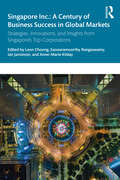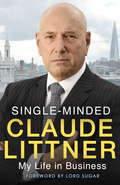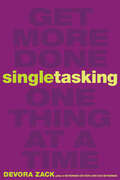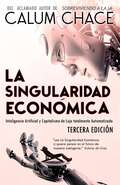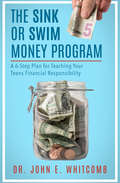- Table View
- List View
Singapore: "Facing Challenges Together"
by Richard H.K. VietorSince its expulsion from Malaysia in 1965, Singapore had transformed itself from a third world island nation into a vibrant city-state with one of the highest levels of GDP per capita in the world. However, sluggish demand among Singapore's major trade partners began testing the nation's export-driven growth model. It was also becoming clear that the Singaporean government could no longer focus single-mindedly on economic growth. Was Singapore facing a mid-life crisis? If so, how could the government revive optimism in the nation's future?
Singapore Inc.: Strategies, Innovations, and Insights from Singapore's Top Corporations
by Leon Choong Easwaramoorthy Rangaswamy Ian Jamieson Anne-Marie KildayThis book features 100 local case studies examining the experiences of leading Singaporean companies across different sectors including aviation, logistics, banking, and real estate. They offer valuable insights into how companies adapted to evolving market dynamics, expanded their business portfolios, ventured into global markets, prioritised sustainability, and leveraged innovation and technology to maintain competitiveness. Through case studies, readers gain practical knowledge that can be applied to their own enterprises, a unique perspective into Singapore’s dynamic and competitive business landscape, and the successes and challenges faced by Singaporean companies. The book is divided into different sections exploring specific themes such as business strategy and transformation, diversification and expansion, sustainability, innovation and technology, financial performance, and risk management. It scrutinises how companies responded to shifting market conditions, competition, regulations, customer preferences, and global events. Additionally, it sheds light on the obstacles companies encountered in terms of sustainable practices, financial performance, risk management, talent retention, and technological advancements. By presenting cases across industries and companies in Singapore, Choong et al. highlight their triumphs, setbacks, and valuable lessons learned. This book can be rendered as a practical and essential resource for business professionals, entrepreneurs, and students interested in understanding effective business strategies.
Singapore Inc.
by Emily J. Thompson Richard H.K. VietorIn early 2003, Prime Minister Goh Chok Tong is assessing Singapore's development strategy--tax cutting combined with an industrial policy focused on six "clusters," including biomedical sciences. After 36 years of stupendous growth, Singapore has slowed down and faces intense competition in exports and foreign direct investment, especially from China. Is its new strategy the right choice? This case examines several key aspects of Singapore's growth, including organizational/cultural arrangements, the savings/investment balance, and total factor productivity growth.
Singapore Metals Limited
by John GourvilleSingapore Metals Limited (SML) has declining sales but has developed a new product (curled metal pile driver pads) that, in field tests, delivers customer benefits that are many times SML's manufacturing costs. Jonathan Lee and Alex Tan of SML's Engineered Products Division are responsible for formulating a strategy for the new product. A key issue is the price to charge for the pads. The case raises issues of analyzing market potential, aligning price with business strategy, and determining the implications of price on the development and execution of integrated strategic options.
Singapore, the Energy Economy: From The First Refinery To The End Of Cheap Oil, 1960-2010 (Routledge Studies in the Modern World Economy)
by Weng Hoong NgSingapore might not have survived the 1960s and prospered thereafter had it not built its economy on the foundations of oil refining, trading and support for oil and gas exploration and production. Cheap oil, sound policies and strong government combined to produce the Singapore economic miracle in its first 50 years of self-rule/independence. With the end of cheap oil, how will Singapore fare and what is the relevance of its model of development for other countries? Singapore’s successful launch coincided with a golden period of cheap energy, and a pro-globalization and free trade environment. These three elements are now under threat from rising energy prices and the global financial crisis which started in 2007 that will leave a lasting impact on the world's political and economic landscape. If the Singapore model is reaching or has reached its peak, what could take its place? This book poses questions for not just for Singapore planners, but also for anyone interested in modern economics and trade beyond the current era. The book also looks into the numerous subsectors within Singapore’s broad energy sector and examines the energy sector’s links with the other pillars of its economy: trade, financial, offshore/marine operations, manufacturing and transportation. It considers possible threats and challenges: Singapore’s rising energy intensity, its vulnerability to energy supply cut-offs, the likely impact of peak oil, terrorism and environmental / climate issues. It also looks at China’s growing investment and role in Singapore’s oil and gas industry. The book is a must-read for an excellent insight into Singapore’s energy economy, filled with data, information, interviews and analyses previously not available to the public.
Singapore TradeNet: A Tale of One City
by John King Benn KonsynskiDescribes the development of a new information technology-based trade document administration environment for the city-state of Singapore. A considerable effort, involving many governmental and private sector organizations, results in a new set of practices and procedures that positions Singapore for leadership as the port of preference in the Pacific Rim.
Singapore's Mid-life Crisis?
by Hilary White Richard H.K. VietorSince its expulsion from Malaysia in 1965, Singapore had transformed itself from a third world island nation into a vibrant city-state with one of the highest levels of GDP per capita in the world. However, sluggish demand among Singapore's major trade partners began testing the nation's export-driven growth model. It was also becoming clear that the Singaporean government could no longer focus single-mindedly on economic growth. Was Singapore facing a mid-life crisis? If so, how could the government revive optimism in the nation's future?
The Single European Market and Beyond: A Study of the Wider Implications of the Single European Act
by Dennis SwannSince the Single Europe Act (1986), attention has largely focused on the creation of a single European market and the much hyped date `1992'. This book examines what is actually entailed by the single market and looks at the other issues and implications of the Single Europe Act. It falls into four parts and considers the economic, fiscal, social a
The Single Market in Insurance: Breaking Down the Barriers (Routledge Revivals)
by Andrew McGeeFirst published in 1998, this volume was formally completed in July 1994, but completing the structure of the market is not all the same thing as having a genuine Single Market. This book explores the difficulties inherent in the concept of the Single Market in Insurance, as well as the practical difficulties of implementation. It looks to the future of the Single Market as well as at the present. It should be of interest to lawyers studying law or EC law, as well as to economists and political scientists interested in the development of Project Europe.
Single-Minded: My Life in Business
by Claude LittnerThe story of a high-stakes careerClaude Littner is best known as the mercilessly tough interviewer on the BBC's award-winning The Apprentice. His abrupt style and zero-tolerance policy on nonsense have become the highlights of every series. But what is he like in real business?Single-Minded reveals the story of Claude's varied career and the turbulent years that shaped him. From being told at school that he would never amount to anything to his current status as a boardroom heavyweight both on-screen and off it, success has never come easy. Claude's complex, fascinating work has taken him into many different industries and countries, encompassing retail start-ups; knife-edge company rescue missions; the bruising rough-and-tumble of Premier League football; facing down French trade unions; taking on Texan oil barons in multi-million-dollar deals; and, in the private sphere, conquering life-threatening illness.Told with characteristic candour and disarming modesty, Single-Minded is an unflinching account of a remarkable career in the spotlight.
Single-Minded: My Life in Business
by Claude LittnerThe story of a high-stakes careerClaude Littner is best known as the mercilessly tough interviewer on the BBC's award-winning The Apprentice. His abrupt style and zero-tolerance policy on nonsense have become the highlights of every series. But what is he like in real business?SINGLE-MINDED reveals the story of Claude's varied career and the turbulent years that shaped him. From being told at school he would never amount to anything to his current status as a boardroom heavyweight both on-screen and off it, success has never come easy. Claude's complex, fascinating work has taken him into many different industries and countries, encompassing:- retail start-ups- knife-edge company rescue missions- the bruising rough-and-tumble of Premier League football- facing down French trade unions- taking on Texan oil barons in multi-million-dollar deals- and, in the private sphere, conquering life-threatening illnessAs Lord Sugar writes in the foreword to Claude's story, the book 'should be recommended reading for anyone who aspires to make their way in business . . . It is instructive and entertaining, providing an interesting insight into the ups and downs of business life and how single-mindedness, openness and determination can yield dividends both financial and personal.'
The Single-Minded Project: Ensuring the Pace of Progress
by Martin PriceThe behaviour of people and their organisation are the primary drivers of a project’s pace of progress. Methodology, tools and techniques are vital but subordinate to human endeavour; if only because their selection, deployment and application entirely depend on the abilities of the project players and their organisation. Performance ultimately rests on human and organisational behaviour: expressed by the players’ experience, professional ability, resolve, dialogue and collaboration. Fresh approaches and methods help practitioners to address this reality productively. This book is written under nine headings: collaboration; able people; strength; connections; rigour; pace; persistence; adaptation; and maturity. The Single-Minded Project offers a new and convincing appreciation of project management that will harness players and their organisation. It recognises that at its heart, the management and leadership of a project regime relies on the choices, behaviours and decisions of its players and the organisation’s freedom of action. It addresses the urgency of the project (the need for swiftness), coupled with the kind and degree of diligence (the need for rigour in the choice and management of method): referring to its Pace of Progress. The success of a project very much depends on the pace at which it is conducted to then deliver value. Projects find themselves in territory where methodology, tools and techniques are of little help. The Single-Minded Project fills that gap and more.
Single Payer Healthcare Reform: Grassroots Mobilization and the Turn Against Establishment Politics in the Medicare for All Movement
by Lindy S.F. HernThe recent rise of “Medicare for All” in American political discourse was many years in the making. Behind this rise is a movement composed of grassroots activists and organizations that have been working for more than three decades to achieve the goal of establishing a single-payer healthcare system in the United States. In the past decade, the Single Payer Movement has grown and garnered more public and political support than ever before. This relative success cannot be attributed to any one political figure or political era. The story of how this happened, and how it is tied to a turn against establishment politics on both the left and right, as well as the rise of outsider politicians such as Senator Bernie Sanders, takes place during the Clinton, G.W. Bush, Obama, and Trump administrations. During each of these eras, activists experienced shifting opportunities that they interpreted through the telling of stories. These narratives of opportunity encouraged participation in particular forms of grassroots mobilization, which then affected the outcome of each era. This has had lasting effects on the development of healthcare policy in the United States. In this book, Hern conducts a political ethnographic analysis in which she uses historical records, interviews, and participant observation to tell the story of the Single Payer Movement, establish the lessons that can be learned from this history, and develop a framework—the Environment of Opportunity Model—that involves a holistic understanding of social movement activity through the analysis of narrative practice.
Single Point of Failure
by Gary S. LynchOver the past decade organizations have faced relentless customer demand for better value at less cost, individual customization, greater choice, faster delivery, higher quality, exceptional service, and more recently - increased environmental and social consciousness. The organization's weapon of choice to address this increasing demand has been the supply chain. However, as the supply chain footprint changed (e.g. outsourcing, off-shoring and customer/vendor empowerment) so did the organization's exposure to uncertainty. Organizations were taken by surprise since this exposure was unanticipated, complex and beyond their ability to manage. As customers become more demanding and change occurs at an even greater pace, supply chain risk continues to propagate like a parasite. Organizations and societies are at much greater risk of systemic failure because of the massive interdependency throughout global supply chains. The priority now is two-fold; play catch-up and address these massive gaps while deploying more intelligent and integrated strategies (i.e. social aware, instinctive, dynamic and predictive) for dealing with continuous change.Single Point of Failure: The 10 Essential Laws of Supply Chain Risk Management uses analogies and dozens of case histories to describe the risk parasite that infects all supply chains while revealing methods to neutralize that parasite. The book addresses the questions: What are the "single points of failure"? How exposed are customers, investors, other stakeholders and ultimately the organization? What is the measurable impact (i.e. brand, financial, strategic, and non-compliance)? Who establishes the "risk paradigm"? How does the organization efficiently and effectively allocate precious resources - time, people, management attention, and capital? How is success measured? This book is both technically powerful and effectively realistic, based on today's complex global economy.
The Single Woman's Guide to Retirement
by Jan CullinaneIf you're one of the 25 million single women over the age of 45 living in the United States today, AARP's The Single Woman's Guide to Retirement is your new best friend. Walking you through the challenges of retired or pre-retired life, from managing your finances to staying healthy in body, mind, and spirit, dealing with divorce, and even looking for love or work, the book covers the issues that really matter to you. Whether you're looking for a retirement home or planning a cruise, this book is packed with specific details to help take the guesswork out of retirement. Author and retirement expert Jan Cullinane has gathered real-life stories from women just like you to illustrate your options and give you fresh new ideas about how to make the most of your retirement years.
Singletasking: Get More Done—One Thing at a Time
by Devora Zack“Can literally double your productivity and performance overnight. This may be the most important book on time and personal management you will ever read.” —Brian Tracy, international bestselling author of Eat That Frog!Your mind can’t be two places at once. Too many of us have become addicted to the popular, enticing, dangerously misleading drug of multitasking. Devora Zack was once hooked herself. But she beat it and became more efficient, and you can too.Zack marshals convincing neuroscientific evidence to prove that you really can’t do more by trying to tackle several things at once—it’s an illusion. There is a better way to deal with all the information and interruptions that bombard us today. Singletasking explains exactly how to clear and calm your mind, arrange your schedule and environment, and gently yet firmly manage the expectations of people around you so that you can accomplish a succession of tasks, one by one—and be infinitely more productive. Singletasking is the secret to success and sanity.“Devora Zack shows us how doing one thing at a time reduces stress, increases efficiency, and produces higher quality results. If you want to work smarter, not harder, read this book!” —Ken Blanchard, #1 New York Times-bestselling coauthor of The One Minute Manager®“Don’t let Zack’s lighthearted tone fool you—Singletasking is backed by hard science, and this book’s pragmatic advice can really change your work and your life.” —David Bach, #1 New York Times-bestselling author of The Automatic Millionaire“Zack shows readers how they can manage the expectations of others, unplug from technology (at times), and operate in the moment.” —Library Journal
Singular Case: Debating China’s Political Economy in the European Enlightenment (McGill-Queen's Studies in the History of Ideas #107)
by Ashley Eva MillarChina held a unique place in European thought during the eighteenth century. Considered a relatively unknown but advanced agrarian and commercial civilization, the Chinese Empire represented the apex of an economic system that was only beginning to be supplanted. Europeans did not assume their superiority and were drawn to study the nature and organization of China’s economy. Analyzing the writings of early modern European travellers, missionaries, merchants, geographers, and philosophers, including Charles de Secondat, Denis Diderot, David Hume, François Quesnay, Abbé Raynal, Jean-Jacques Rousseau, Adam Smith, and Voltaire, A Singular Case evaluates the circulation of information about the Chinese political economy that fed European imaginations. Ashley Millar examines perceptions of China’s science, technology, and moral and behavioural foundations, foreign trade policies, and the form and function of China’s government in order to question the extent to which consensus emerged on China’s successes and failures and to assess how knowledge of the Chinese system influenced the Enlightenment Shedding light on contemporary debates on the rise of the west and the Great Divergence from a historical vantage point, A Singular Case offers striking observations on Western views of early modern China.
Singular Spectrum Analysis: Using R (Palgrave Advanced Texts in Econometrics)
by Hossein Hassani Rahim MahmoudvandThis book provides a broad introduction to computational aspects of Singular Spectrum Analysis (SSA) which is a non-parametric technique and requires no prior assumptions such as stationarity, normality or linearity of the series. This book is unique as it not only details the theoretical aspects underlying SSA, but also provides a comprehensive guide enabling the user to apply the theory in practice using the R software. Further, it provides the user with step- by- step coding and guidance for the practical application of the SSA technique to analyze their time series databases using R. The first two chapters present basic notions of univariate and multivariate SSA and their implementations in R environment. The next chapters discuss the applications of SSA to change point detection, missing-data imputation, smoothing and filtering. This book is appropriate for researchers, upper level students (masters level and beyond) and practitioners wishing to revive their knowledge of times series analysis or to quickly learn about the main mechanisms of SSA.
Singular Spectrum Analysis for Time Series (SpringerBriefs in Statistics)
by Nina Golyandina Anatoly ZhigljavskyThis book gives an overview of singular spectrum analysis (SSA). SSA is a technique of time series analysis and forecasting combining elements of classical time series analysis, multivariate statistics, multivariate geometry, dynamical systems and signal processing. SSA is multi-purpose and naturally combines both model-free and parametric techniques, which makes it a very special and attractive methodology for solving a wide range of problems arising in diverse areas. Rapidly increasing number of novel applications of SSA is a consequence of the new fundamental research on SSA and the recent progress in computing and software engineering which made it possible to use SSA for very complicated tasks that were unthinkable twenty years ago. In this book, the methodology of SSA is concisely but at the same time comprehensively explained by two prominent statisticians with huge experience in SSA. The book offers a valuable resource for a very wide readership, including professional statisticians, specialists in signal and image processing, as well as specialists in numerous applied disciplines interested in using statistical methods for time series analysis, forecasting, signal and image processing. The second edition of the book contains many updates and some new material including a thorough discussion on the place of SSA among other methods and new sections on multivariate and multidimensional extensions of SSA.
Singular Spectrum Analysis with R (Use R!)
by Nina Golyandina Anton Korobeynikov Anatoly ZhigljavskyThis comprehensive and richly illustrated volume provides up-to-date material on Singular Spectrum Analysis (SSA). SSA is a well-known methodology for the analysis and forecasting of time series. Since quite recently, SSA is also being used to analyze digital images and other objects that are not necessarily of planar or rectangular form and may contain gaps. SSA is multi-purpose and naturally combines both model-free and parametric techniques, which makes it a very special and attractive methodology for solving a wide range of problems arising in diverse areas, most notably those associated with time series and digital images. An effective, comfortable and accessible implementation of SSA is provided by the R-package Rssa, which is available from CRAN and reviewed in this book. Written by prominent statisticians who have extensive experience with SSA, the book (a) presents the up-to-date SSA methodology, including multidimensional extensions, in language accessible to a large circle of users, (b) combines different versions of SSA into a single tool, (c) shows the diverse tasks that SSA can be used for, (d) formally describes the main SSA methods and algorithms, and (e) provides tutorials on the Rssa package and the use of SSA. The book offers a valuable resource for a very wide readership, including professional statisticians, specialists in signal and image processing, as well as specialists in numerous applied disciplines interested in using statistical methods for time series analysis, forecasting, signal and image processing. The book is written on a level accessible to a broad audience and includes a wealth of examples; hence it can also be used as a textbook for undergraduate and postgraduate courses on time series analysis and signal processing.
La Singularidad Económica: Inteligencia Artificial y Capitalismo de lujo totalmente automatizado
by Calum ChaceLa singularidad económica tendrá lugar en el momento en que la mayoría de las personas no pueda encontrar empleo, porque las máquinas puedan hacer todo lo que los humanos pueden hacer por dinero a un menor costo, más rápido y mejor que ellos. Algunos dicen que esto nunca sucederá, pero la mayoría de los profesionales de la IA creen que sí, aunque no se ponen de acuerdo cuándo. La inteligencia artificial (IA) ya sobrepasa a los humanos en absorber y procesar información. Los robots se están volviendo cada vez más diestros, flexibles y seguros (excepto los militares). La IA es nuestra tecnología más poderosa y debemos comprenderla. Esta tercera edición del libro más vendido de Calum Chace se ha actualizado y ampliado sustancialmente. Sostiene que la singularidad económica es el desafío más importante que enfrentará la humanidad en la primera mitad del siglo XXI, y también su oportunidad más interesante. Los coches autónomos y los teléfonos inteligentes con los que puedes conversar pueden ser los canarios en la mina de carbón, lo que brinde una llamada de atención para todos aquellos que aún dudan de su inminencia. Todos los trabajos se verán afectados, desde los empleos de comida rápida hasta abogados y periodistas. La popular creencia de que la Renta Básica Universal es la solución es sólo parcialmente correcta. Probablemente vamos a necesitar un sistema económico completamente nuevo, y pronto deberíamos comenzar a planificar para prepararnos para la Singularidad Económica. Chace sostiene que el resultado puede ser muy bueno: un mundo en el que las máquinas hacen todos los trabajos aburridos y los humanos hacen prácticamente lo que les place. Pero advierte que existen grandes riesgos, que solo podemos evitar estando alerta a los posibles futuros y planificando cómo evitar los negativos. Chace ha estado escribiendo sobre IA desde 1980 y ha escrito dos libros de no ficción muy vendidos y también dos novelas sobre el tema. En 201
Sinicizing International Relations
by Chih-Yu ShihSinicizing International Relations brings civilizational politics back to the studies of international relations and questions the notion of a rising Chinese nation by deconstructing the possibility of looking at China in its entirety. The works of scholars writing on China are influenced by their own historical and philosophical backgrounds and the daily political and economic conditions in which they live and work. Their writings on China rising intrinsically reflect their encounters and choice. Studying the rise of China involves interactions between the identity of the observers who are doing the studying and the identities of China. Each set of interacting identities comprises choices on at least three levels: civilizational, national, and (sub)ethnic. As a result, intellectual choices of identity become intrinsic to international relations scholarship, and international relations acquire complicated cultural meanings in East Asian communities, which contemporary international relations theories fail to comprehend.
Sink or Swim: Get Your Degree Without Drowning in Debt
by Sarah DeveauUndergraduate fees for universities and colleges across Canada have more than doubled in every province over the past decade. Today, the average student debt load after graduation is almost twenty-thousand dollars. Individuals considering a post-secondary education are looking for intelligent, resourceful ways to fund their education without mortgaging their future. Those currently in school are trying to find ways to cut their spending, increase their income, and make it to convocation without incurring massive debt. Sink or Swim is the answer to their troubles. This book will guide students through their post-secondary education, encouraging them to live within their means by being creative with their lifestyle.
The Sink or Swim Money Program: A 6-Step Plan for Teaching Your Teens Financial Responsibility
by John E. WhitcombA step-by-step guide to teaching kids fiscal responsibility, and instilling positive spending habits that will last a lifetime. Children don&’t know much about money—they just know what they want (like overpriced junk food and the most expensive sneakers). But learning a little financial wisdom can set them on a path that will make their futures significantly better—and allow them to navigate a scary adult world full of spending pitfalls. In this book, Dr. John E. Whitcomb provides a six-step program to do just that. It begins with letting go. Terrifying as it seems, your children learn more with the power of non-essential spending in their own hands. With the freedom to spend as they please and make their own mistakes, spending money becomes not an argument, but an important lesson in priorities. But they won't be alone in the wild with a pocket full of cash. Whether for school, clothes, or hobbies, teens and parents can sign a contract detailing the limits of their spending that work for each of them. From day-to-day decisions all the way to the milestones of adulthood—opening their first checking account, college savings, and getting their first car—Dr. Whitcomb's application of the capitation method prepares them for every step of their financial journey. &“Explains Whitcomb's original and systematic technique for teaching kids how to manage money responsibly.&”—Publishers Weekly Previously published as Capitating Your Kids: Teaching Your Teens Financial Independence
Sinn und Arbeit: Antworten zur Sinnsuche im 21. Jahrhundert – Viktor E. Frankl und andere
by Beate von DevivereDie Sinnsuche ist eines der aktuellsten und wichtigsten Themen des 21. Jhdt., besonders im Kontext von Arbeit. Dieses Buch setzt hier an und beschreibt den Sinn in der Arbeit als eines der aktuellsten und relevantesten Themen der Arbeitswelt im 21. Jahrhundert. Einprägsam und gekonnt verbindet die Autorin Erkenntnisse aus der Motivationsforschung und besonders von Viktor Frankl als international anerkannter Pionier des Sinns. Basierend auf den aktuellen Erkenntnissen aus Psychologie und Arbeitswissenschaft, der Organisations- und Managementforschung sowie der Personalentwicklung finden Sie darin zusätzlich: ein Vorwort von Univ.-Professor Dr. Alexander Batthyány, Vorstandsvorsitzender des internationalen Viktor Frankl Instituts in Wien, eindrückliche und herausragende Beispiele aus der Praxis der internationalen Arbeitswelt zur Verwirklichung von Sinn in der Arbeit. Das Werk ist optimal für alle, die in Forschung und Praxis Sinnverwirklichung in der Arbeit weiter entwickeln wollen und die die aktuellen Krisen, epochalen Herausforderungen und Zukunftsaufgaben wirkungsvoll meistern und sinnvolle Veränderungen vorantreiben wollen. Zielgruppen: Führungskräfte, Experten und Fachkräfte, Organisationen, Unternehmen, Berater, Personal- und HR-Manager, Wirtschafts- und Arbeitspsychologen.

